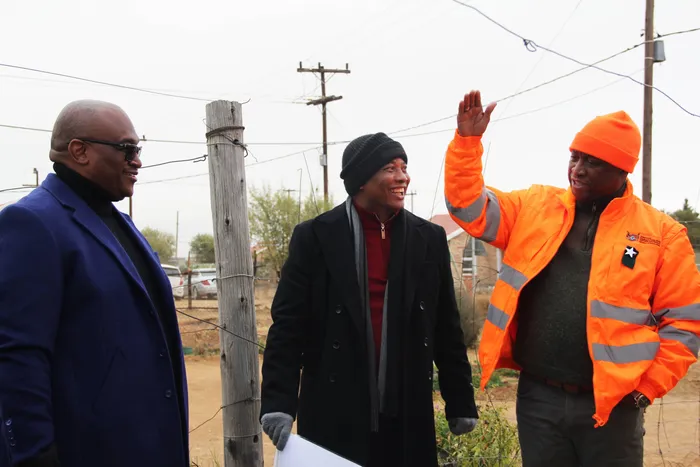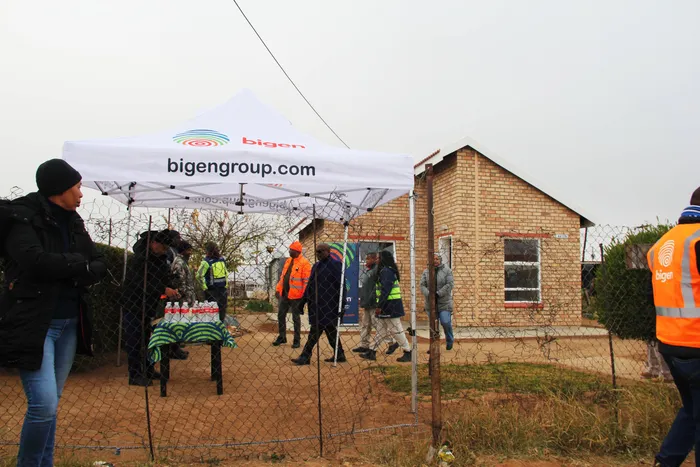Kimberley and NC residents face soaring prices and failing municipalities

The MEC for Coghsta, Bentley Vass, the chief director for human settlements, Gratitude Booysen, and the HOD, Bafedile Lenkoe.
Image: Sandi Kwon Hoo / DFA
AS KIMBERLEY braces for another shutdown over unaffordable electricity prices on July 14, the Auditor-General has revealed that the Sol Plaatje Municipality incurred unacceptably high water and electricity losses during the 2023/24 financial year.
Residents are already feeling the pinch after the price of petrol, water and electricity increased this week.
New water tariffs for residential and commercial use (increase of 4.4%):
- Block 1: 0–6 kl – R8.42
- Block 2: 7–20 kl – R35.76
- Block 3: 21–40 kl – R40.25
- Block 4: 41–60 kl – R42.58
- Block 5: 60+ kl – R45.49
New residential electricity tariffs (increase of 9.6%):
- Block 1: 0–350 kWh – R3.15
- Block 2: 351+ kWh – R3.99
Fuel increases:
- Petrol 93 – up by 55 cents
- Petrol 95 – up by 52 cents
- Diesel 0.05% – up by 82 cents
- Diesel 0.005% – up by 84 cents
Audit reveals massive service delivery failures
In the audit outcomes released on May 28, Auditor-General Tsakani Maluleke attributed Sol Plaatje’s massive service delivery losses to years of neglected preventative maintenance. The municipality reportedly incurred total losses of R277.64 million, losing approximately 66% of all treated water — more than double the National Treasury’s 30% benchmark — and 24% of purchased electricity, exceeding the acceptable norm of 7-10%.
Maluleke also revealed that unauthorised expenditure in the Northern Cape rose from R7.38 billion in 2020/21 to R8.13 billion in 2023/24.
“Non-compliance with supply chain management legislation continued to be the main contributor to irregular expenditure,” she noted.
She added that the irregular expenditure closing balance remained high at R3.67 billion, of which only R930,000 was in the process of recovery.
“This was due to a lack of investigations to determine whether any official was liable for the expenditure.”
She pointed out that Northern Cape municipalities failed to deliver essential infrastructure projects to address service delivery backlogs and improve communities’ access to basic services.
“We identified shortcomings in water and sanitation projects at five municipalities. Insufficient preventative maintenance was prevalent, as municipalities spent only two percent of the value of their infrastructure assets on repairing and maintaining those assets – far below the National Treasury norm of eight percent.”
High levels of non-compliance
Municipalities in the Northern Cape continue to show high levels of non-compliance with key legislation and have failed to obtain clean audits since 2020/21.
Maluleke stated that Hantam Local Municipality regressed from a clean audit in 2021/22 to an unqualified audit opinion with findings in 2022/23, mainly due to the departure of the municipal manager and the chief financial officer, who were instrumental in driving the positive outcomes.
“In 2023/24, the municipality regressed to a qualified opinion with findings on performance reporting and compliance with key legislation. The head of supply chain and senior accountant positions also became vacant during this period. This left only one official to perform the financial functions of the municipality, including adequately preparing and reviewing the financial statements and implementing proper record-keeping. The council did not intervene and the audit committee’s interventions were limited. A chief financial officer was appointed in October 2024, which resulted in some improvement in the submission of information, but the official had limited impact due to being appointed so late in the audit process.”
The Frances Baard and Namakwa district municipalities were the only two to maintain clean audits for four or more consecutive years.
The Auditor-General also criticised the provincial Department of Co-operative Governance for failing to stabilise municipalities by filling key leadership positions.
“The call to improve financial reporting and align budgets and service delivery plans to community needs went unheeded.”
She added that 21 municipalities, or 70 percent, did not have credible financial statements.
"Since 2020/21, only Frances Baard and Namakwa district sustained clean audits while Kareeberg Municipality changed from manual to an electronic system after the chief operations officer and senior accountant left. The municipality was unable to provide information on selected transactions, often due to skills and capacity constraints.
“In Tsantsabane, the resignation of the chief financial officer (CFO) and financial accountant before the submission of financial statements left the remaining officials unable to assist auditors as they lacked the required financial skills and experience.”
She added that after a long history of disclaimed audit opinions, Joe Morolong Local Municipality improved to a qualified audit opinion in 2023/24.
“This improvement can be attributed to a strong commitment from the mayor and the accounting officer to resolve prior-year matters, improved record keeping with assistance from the provincial Co-operative Governance Department, as well as quarterly meetings with the audit team.”
She stated that in 2023/24, only four municipalities (13 percent) submitted credible financial statements, compared to five (17 percent) in 2020/21, despite the province having spent R150.51 million on financial reporting consultants.
“Four of the six municipalities (67 percent) that achieved an unqualified audit opinion with findings could only do so after making material adjustments to their financial statements. The financial health of many municipalities suffered because they lacked the basic controls to bill all consumers, resulting in less money being available for service delivery priorities. The submission of financial statements improved from 2020/21, owing to the role played by the MEC for Finance.”
She indicated that 73 percent (22 municipalities) continued to struggle with performance reporting.
“Siyathemba, Siyancuma and Ubuntu local municipalities did not submit performance reports last year.”
Financial health continues to deteriorate
She added that non-compliance with legislation resulted in a likely financial loss of R129.45 million, as well as substantial harm to the public and municipalities in the province.
“Municipalities’ financial health continued to deteriorate as they still did not collect most of the revenue owed to them, resulting in them struggling to pay their suppliers and third parties.”
She added that action would be taken after pension fund contributions were not paid over at Renosterberg Local Municipality.
“Overall, the lives of the people of the Northern Cape are negatively affected by municipalities’ inability to properly manage the resources that they control. We are calling on all provincial oversight and municipal leadership to thoroughly and honestly reflect on the initiatives implemented, and the effort they have put in to improve the current state of municipalities,” Maluleke concluded.

One of the newly built houses in Jacksonville visited by a delegation from Coghsta.
Image: Sandi Kwon Hoo / DFA
Provincial response
The MEC for Co-operative Governance, Human Settlements and Traditional Affairs (Coghsta), Bentley Vass, acknowledged the poor audit outcomes.
“We are not happy with the performance of our municipal audit outcomes for 2023/2024. We will continue to support municipalities,” he said.
Vass expressed concern over high levels of fruitless and wasteful expenditure, with municipalities now struggling to deliver services, pay salaries, and meet third-party obligations.
He also highlighted the need to appoint ethical and effective leadership, along with competent and skilled administrative staff, including municipal managers and chief financial officers.
“We are currently in court over the appointment of the technical manager at Joe Morolong Municipality. At Nama Khoi Municipality, we have an official who has exceeded retirement age and is refusing to go on pension,” he noted.
The executive manager of Co-operative Governance, advocate Mogami Manyeneng, confirmed that no bailouts would be provided to municipalities indebted to Eskom and water boards.
“Municipalities are expected to honour their payment agreements with the allocated funding,” he said.